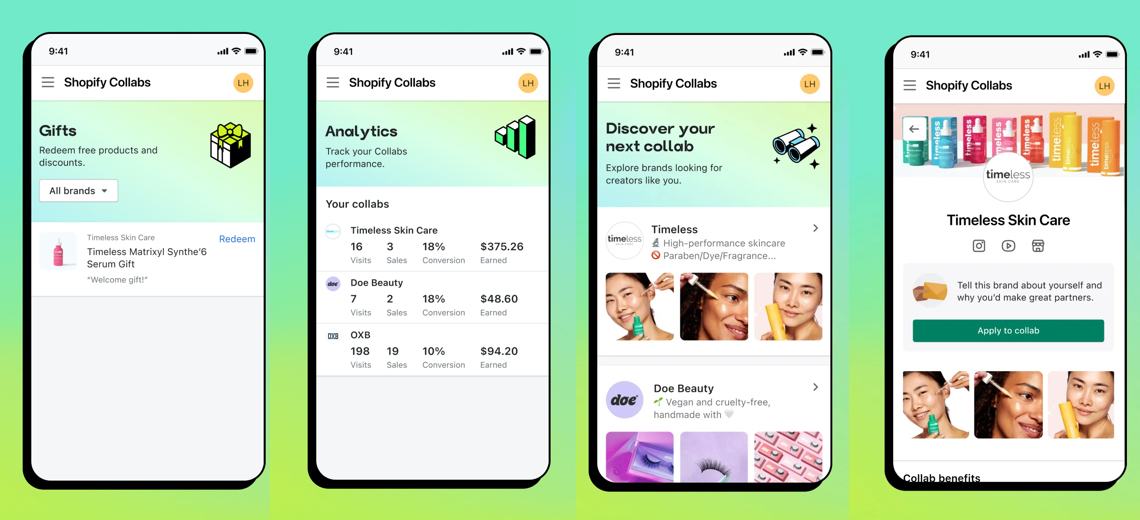How beauty is leveraging Shopify’s new influencer platform
For beauty brands using Shopify, a direct connection between checkout and influencer promotions is the latest development in the transformation of influencers into retailers.
On August 16, Shopify unveiled its Shopify Collabs tool, which allows approved creators to partner with Shopify merchants and earn revenue. Open to U.S. and Canada-based creators and brands, the platform launch is the latest development to come out of Shopify’s April acquisition of Dovetale, an influencer marketing software startup. The move comes as influencers are increasingly evolving into merchants, with a growing number of affiliate programs enabling brands to directly track their sales.
The beauty category is “near the top of where we’re seeing traction with this today,” said Daniel Debow, vp of product at Shopify. Following Shopify’s acquisition of Dovetale in April, existing Dovetale clients with Shopify were offered Dovetale services for free. Now, its platform has been fully integrated into the Shopify dashboard.
Among these clients is body-care brand Nécessaire, which has ramped up its influencer marketing spend as first a Dovetale and now a Shopify Collabs user. When the brand launched in 2018, it had no budget allocated for influencer marketing for nine months. Now, influencer marketing makes up 20% of its marketing spending.
“The first year, we were living in Excel sheets with lists of people that were texting, emailing and DMing us, ‘Can we be an ambassador of the brand?’” said Randi Christiansen, co-founder and CEO of Nécessaire. Shopify Collabs is “a tool that allows companies to create a community very effectively,” and manage creator marketing in “a way more systematic approach than if it was done in-house.” Beyond its website, Nécessaire is sold at retailers including Sephora, Violet Grey, Nordstrom and Net-a-Porter.
Meanwhile, influencers approved via the Shopify application process can use the platform to select from different brands they want to work with, and then send another application in-app to apply to a brand’s affiliate program. If approved, they receive a welcome package with products to review and an affiliate link to earn commission.
“Shopify Collabs is helping us with more of the seeding, the affiliate programs — these sorts of tactics [that let us work with] people who are coming and knocking at our doors and saying, ‘Hey, we would like to represent your brand,’” said Christiansen.
The platform is “user-friendly and has niche brands that my audience would really enjoy,” said Cathy Nguyen, a beauty influencer on the platform, who is interested in applying to work with Danessa Myricks Beauty and Kim Chi Chic Beauty. She plans to use the platform on both TikTok (where she has 348,000 followers) and Instagram (45,000 foll0wers). To participate in the program, influencers share a link in bio directing to their curated list of items in Shopify’s link-in-bio platform, Linkpop. Users can then click the items to check out with Shopify.
According to Debow, Shopify’s platform is different from existing influencer affiliate platforms such as LiketoKnowIt because of its direct integration with Shopify checkout. “It’s an actual purchase through a marketplace that the creators established,” he said.
The new launch came only a week after Instagram announced it would be shutting down its own in-house influencer affiliate shopping program launched in January. Despite having the advantage of in-feed product links, participating creators were not allowed to tag products by brands that were not in the affiliate shopping program.
But Shopify Collabs is not the only affiliate marketing platform that sees a much bigger opportunity in influencer affiliate sales. In July 2021, influencer marketing platform Emcee launched, also relying on a link-in-bio setup along the lines of LiketoKnowIt.
Demand for affiliate marketing stems, in part, from brands’ growing aim to measure the ROI of influencer promotions in exact sales numbers.
“As creators became a channel, people were less worried about conversion,” said Debow. “It’s probably fair to say that, as the market is maturing, marketers are interested in finding measurability” of how well an influencer promo will work. In his view, clear measurement of sales performance tracked in the Shopify dashboard will lead to expanded influencer marketing budgets.
In addition, Debow predicted that this will lead to a greater shift from measuring influencers by follower counts.
“You find that multiple small micro-creators could drive just as many sales or more than a large macro-creator,” he said. “[Shopify] Collabs is a transformation of how influencer marketing is going to work.”
Shopify’s announcement of partnerships with social platforms including TikTok, Snapchat and Pinterest, along with the launch of Collabs, is part of its big bet on the growing role of influencers.
“This is definitely a huge future frontier of how people will sell things. The ability of a relatively small influencer to be highly influential, both to their audience and to a merchant, cannot be underestimated,” he said.





